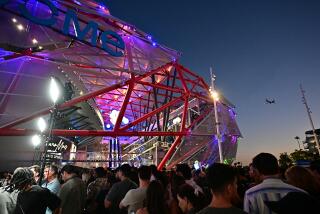Seattle mayor wants to relax 2 a.m. bar closure
In a city that has seen itself has a leader of new globalism, an urban headquarters for the 24/7 economy, there seem fewer reasons than ever to stop drinking just because it’s 2 a.m.
That’s the way Seattle Mayor Mike McGinn sees it, anyway. A new “nightlife initiative” he’s promoting would look at keeping some of the city’s bars open later, or even all night — recognition, he says, that a modern city’s economy no longer has to stop functioning when the bankers go home at 5.
City Atty. Peter Holmes — whose predecessor backed an unpopular crackdown on some of the city’s often-boisterous nightclubs — has thrown his support behind the proposal.
“A safe, vibrant nightlife is important to Seattle’s emergence from this stubborn recession and maintaining our creative, dynamic and sociable urban culture,” Holmes said when the initiative was announced this month.
The move to consider relaxing the 2 a.m. bar closure that is the law across Washington state — as it is in many cities across the country — is only part of a package of measures McGinn hopes could end the chronic conflict between rowdy bars and sleepless neighbors that has festered in popular neighborhoods, such as Belltown and Fremont.
Seattle has begun to achieve what many cities only dream of: convincing citizens that living in the heart of the city, even downtown, is an attractive alternative to the suburbs.
Pricey, mid-rise condos populate areas like Belltown, alongside some of the city’s favorite nightspots, including the club that godfathered the Seattle grunge scene, the Crocodile.
Last call on weekends often unleashes a flood of mayhem into the streets. Hundreds of rowdy people, many reluctant to go home, are suddenly wandering the streets. Though most limit themselves to whoops, enthusiastic renditions of the last song heard and the occasional upchuck, sometimes fights ensue.
On June 6, a 21-year-old man was shot to death and a 44-year-old man was shot and critically injured just before 3 a.m. outside a Belltown bar. In another incident in March, the owner of the same bar fired a weapon outside to break up a fight.
On June 20, a man was shot in the neck and jaw after leaving another Belltown club. A few blocks away that same night, another man was beaten unconscious at 2:40 a.m. after confronting four men who were making catcalls at his girlfriend.
“Many of us, if we’re not accosted, we’re verbally abused on the street. It’s a large-crowd mentality, its unruly, frequently it’s inebriated, and the result is that many residents unfortunately don’t partake of the nightlife because they don’t feel safe on the streets,” said Richard Nordstrom, president of the Belltown Community Council.
The Seattle Police Department has already dispatched more officers around nightclubs at closing time, but McGinn said it might help if all the bars didn’t let out at once.
“What we have now is a 2 a.m. closing time, so all the bars simultaneously are sending out onto the street people who have been having a good time,” McGinn said in an interview.
Thinking about extending bar hours — a measure that would have to win the approval of the City Council and state Liquor Control Board, which so far seems skeptical — is only part of McGinn’s plan.
He also wants to adjust penalties for fighting and disorderly behavior, which would allow police to write numerous expensive tickets instead of having to arrest a few suspects and spend the rest of the night booking them in jail.
The nightlife initiative, among other things, also calls for requiring bar security staff to get police training.
Across the country, cities including New York, Las Vegas and some spots in Chicago allow late-night drinking. A number of studies shows longer bar hours often mean more problems and more drunk driving arrests.
Belltown residents are not yet ready to embrace the plan without looking at it harder. “The industry has pushed very hard for deregulation, when in fact they’re not regulated enough,” Nordstrom said of the bar industry.
But bar owners, many of whom have come out in support of the initiative, say later closing times would buttress the nighttime economy, boost tax revenues and recognize that nightlife neither starts nor winds down when it once did.
“Young people are coming out later. There’s nothing wrong with that, it’s just a social shift, and we’d be foolish to think that we’re going to change that. I know I can do my banking in my pajamas at any time I want to from my computer, so a lot in our lives has changed,” said Pete Hanning, president of the Seattle Nightlife and Music Assn. and owner of the Red Door bar in Fremont.
More to Read
Sign up for Essential California
The most important California stories and recommendations in your inbox every morning.
You may occasionally receive promotional content from the Los Angeles Times.









